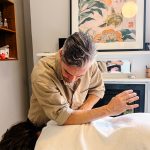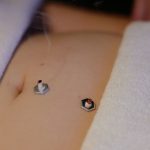
If you’ve had a child in recent years and are struggling with fatigue there is a good chance you are experiencing some level of Postnatal Depletion.
Postnatal depletion is a relatively new term coined by Dr. Oscar Serrallach who describes it as “more than fatigue, but not the same as postnatal depression“. It’s possible for postnatal depletion to hit at any time and easily affects partners as well as Mums. It stems from a wide variety of factors that can arise during pregnancy, delivery and post birth.
You might experience post natal depletion as a fluctuating combination of foggy “baby-brain”, mild anxiety, low moods, overwhelm and fatigue. While it’s easy to put these feelings down to sleep deprivation and dismiss them as just “being a new parent”, low moods and extreme fatigue don’t have to be your new norm.
In Chinese Medicine, depletion is referred to as deficiency.
There can be a deficiency of Yin, Yang, Qi or Blood. Essentially it is a lack of resources. You can think of the body’s energy as a perfectly blown up balloon. A good firm skin containing just the right amount of air (resource). Any event that requires energy puts a tiny pin prick in the balloon’s skin, making us sag just a little. These pin holes are easy to heal and our energy can rectify as long as we have the appropriate resource and time to do so. If you take a minute to stop and think about the energy needed to support a pregnancy, give birth and breastfeed it’s easy to see where the larger pin holes come from. Add to that sleep deprivation, ridiculous arguments with your three year old and the general juggle of work-life smaller pin pricks can come thick and fast leaving us very saggy indeed.
So at the end of the day it’s not just one thing, it’s the accumulation of so many things.
How to rectify/avoid post natal depletion
Nourish your body:
Eating well is the number one way to replenish your resources. It’s so easy to forget to eat or put it off until later, but food is important to prioritize. Eating regular meals with a good quality protein is key. It doesn’t have to be fancy, eggs and avocado on toast, tuna and rice, hummus and tomato on rye or a hearty soup will serve you well. Just keep in mind protein, a little bit of carbohydrate and some kind of vegetable at least three times per day.

Rest to replenish:
Try to factor in some downtime for yourself during the day. This can be challenging for sure, but it’s really about boundaries. Asking people, young and old, to wait just a minute so you can catch a breath. Sitting down for a cup of tea before launching into the next task, or maybe leaving five minutes early so you’re not rushing will go a long way to reducing those small pin pricks. If you really can’t find the time during the day, get into bed early and aim for a good night’s sleep.
Gentle exercise:
Finding the balance here can be difficult. It is important to move, but just as important not to over do it. In the early months, post birth walking and gentle stretching is enough. As you start to recover, doing a little strength training can really help that abdominal and pelvic area. If you find yourself feeling more fatigued soon after exercise you are overdoing it and need to pull back.
Let it go:
Stop and ask yourself – really, how important is it?? Does it really matter if it’s not done ‘right’ ? Do we really need to clean the windows or iron the sheets? Is this activity worth it? If the answer is no – then let it go! By reducing your ‘to do list’ and expectation to have things done perfectly you will reduce your stress levels significantly.
 Ask for help:
Ask for help:
Where are you struggling? What jobs can you outsource? Getting someone in to clean, even if it’s once a fortnight, can help a lot. Try using a grocery delivery company rather than going to the shops. Ask someone to mind the kids for an hour so you can do something for yourself.
Get some treatment:
Chinese medicine really understands depletion. A couple of treatments and some personalized herbs can bring you back into balance. In a 2017 study showed that Acupuncture and Drugs Found Equally Effective For Mild Depression which is great news if you would like to avoid stronger medications.
Talk about it:
You’re not alone in those days when you’re just feeling flat… talk to your parent’s groups, family, partners and friends or with your Chinese Medicine Practitioner.
An interesting side note:
Weening can cause a change in hormones and lead to depression in some women so if you’re about to ween it’s a good time to check in with your self, your OBGYN, your partner. Pinky Mackay article wrote a great about it if you’re interested (Breastfeeding – weaning blues, the depression nobody talks about)
If this article has brought up any issues for you we recommend seeking help from the wonderful folk at PANDA





